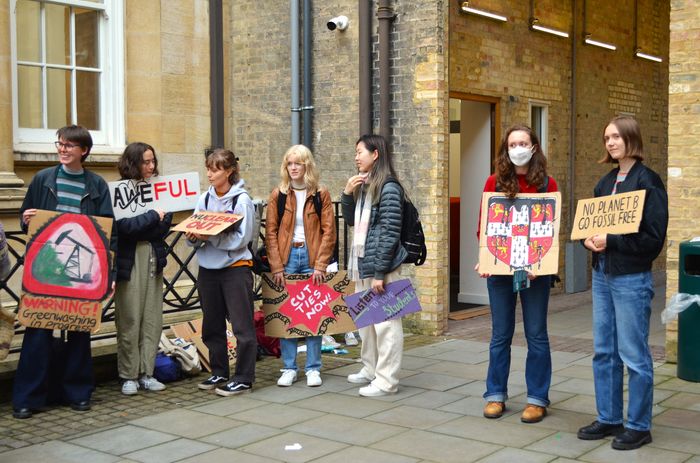Cambridge running out of time on carbon targets, says University watchdog
One academic claimed that the University is ‘clearly struggling’ to hit its decarbonisation targets

The University of Cambridge is facing criticism over its approach to climate change, after the University was accused of lacking “urgency” on the issue.
In their annual report to the University, the Board of Scrutiny claimed that “concerted action is urgently needed” for the University to meet its climate change goals.
These findings have been slammed by academics, who have claimed that the University is not taking drastic enough action to hit their targets on reducing their carbon emissions.
The annual report by the watchdog claimed that Cambridge “could have moved further and faster” to hit its carbon targets. The head of the University’s carbon zero initiative has echoed this language, telling Varsity that Cambridge, as well as the UK, should more “further and faster” on climate action.
The University aimed to reach “absolute zero” carbon emissions by 2048, and to cut this figure by 75% between 2015 and 2030. The University’s approach has left “scant time” to achieve these targets,” it said.
The memo has warned that “concerted action is urgently needed” to hit these goals, writing: “The Board is concerned that a sense of urgency is not shared across the distributed decision-making of the University.”
The watchdog said: “The Council’s current approach to operational environmental sustainability risks introducing delays to the University’s carbon reduction commitments.”
University Council is Cambridge’s executive decision-making body, which includes the vice-chancellor, pro-vice-chancellors, the SU president, and some senior academics.
The board names various policies which it believes contributes to a lack of urgency on climate, including the decision not to develop a new solar farm, and the failure of a vice-chancellor-backed proposal to create a pro-vice-chancellor role for sustainability.
This policy, which was voted down by staff earlier this year, which the board says “introduces risks of missed opportunities for joined-up responses” and “sets back” University leadership’s “commitment to come up with a comprehensive strategy”.
University Council’s approach “raises the question of who will provide leadership on operational environmental sustainability,” the report added.
Professor Jason Scott-Warren, a Gonville & Caius fellow and member of University Council, told Varsity that Cambridge is “clearly struggling to get its large decarbonisation programme rolling, but it is making genuine efforts to speed things up”.
“I am more concerned by the University’s ongoing willingness to work with fossil fuel companies that are jeopardising the Paris Agreement, and its failure to enter a climate emergency mode across the range of its activities,” he said.
In July, the University announced that they would be willing to accept millions in donations from the fossil fuel industry in “exceptional circumstances,” despite having placed a temporary ban on taking any money from the industry four months prior.
Scott Warren’s concerns were echoed by Professor Emily Shuckburgh, head of Cambridge Zero, an institute designed to be “Cambridge University’s response to climate change”. They are tasked with developing interdisciplinary research about how societies can transition to a zero-carbon future.
Prof Shuckburgh told Varsity: “The UN [recently] released a report warning that current policies are putting the world on course for catastrophic global warming of up to 3.1 °C this century and Cambridge Zero released a flagship report which highlighted that not only is investment in decarbonisation the right thing to do, it is the economically sound thing to do.”
“The UK needs to put in place the leadership and support to go further and faster in its decarbonisation plans, and the same is true for this University,” she said.
The institution recently released a report in which they called on institutions to “stop relying on narrow, project-by-project cost-benefit analysis for strategic decisions,” and make “tough policy decisions” to address the climate crisis.
Last year, a report by UN climate champion Nigel Topping call on Cambridge to sever its ties to the fossil fuel industry, which it said posed “reputational risk” to the University.
A spokesperson for Cambridge Climate Justice (CCJ), a student campaign group, told Varsity: “We are glad that the board’s report recognises the importance of the Topping recommendations and we echo their calls for faster progress on divestment from the fossil fuel industry.”
“Students, staff and the community deserve a coordinated and transparent response to the climate crisis,” they said.
A spokesperson for the University of Cambridge told Varsity: “The University remains firmly on track to meet its commitments to reduce energy-related emissions from across its estate. A number of heat degasification projects have been identified that will help meet those reduction targets, as well as other low-carbon heating solutions.”
“The University is strengthening its approach to operational environmental sustainability and has recently announced plans to develop a sector-leading approach,” they added.
 News / Uni partners with controversial Hong Kong university2 April 2025
News / Uni partners with controversial Hong Kong university2 April 2025 News / Hundreds of jobs to be cut at Cambridge University Hospitals1 April 2025
News / Hundreds of jobs to be cut at Cambridge University Hospitals1 April 2025 Comment / More Cambridge students should study abroad 1 April 2025
Comment / More Cambridge students should study abroad 1 April 2025 News / Caius clock hand returned nearly 100 years after student prank31 March 2025
News / Caius clock hand returned nearly 100 years after student prank31 March 2025 Lifestyle / A Goodchild’s Cambridge Confessional: Volume 23 April 2025
Lifestyle / A Goodchild’s Cambridge Confessional: Volume 23 April 2025



